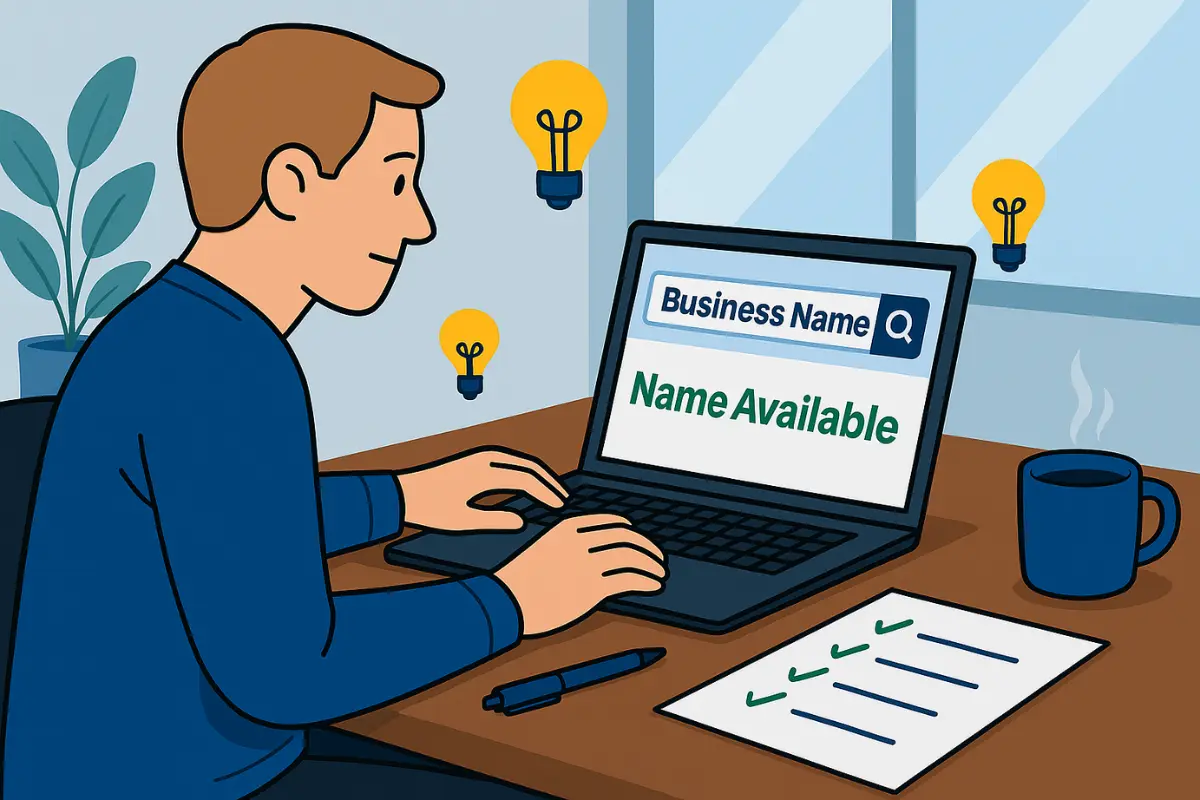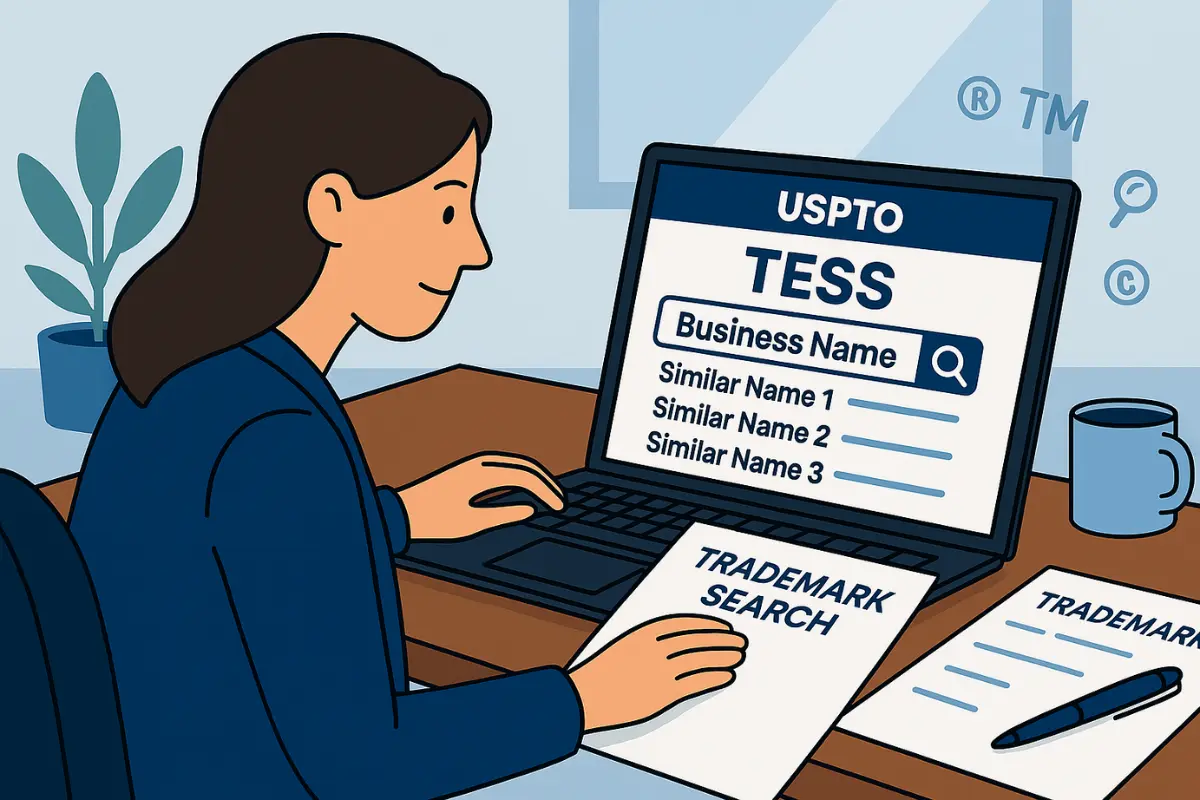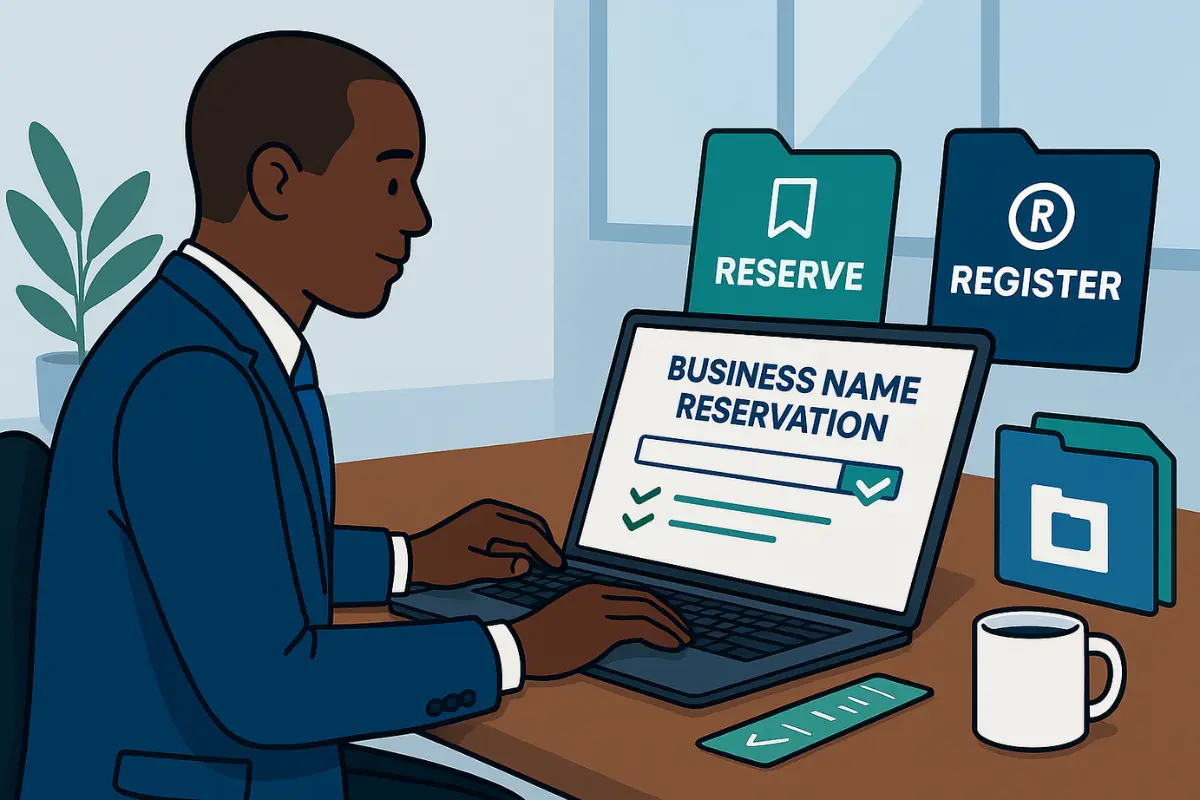Business Name Availability: How to Check It Before You Register

You've spent months perfecting your business plan, designing your logo, and building excitement around your new business venture, only to discover someone else already owns your chosen business name. Rebranding can cost thousands of dollars, not to mention the loss of time and momentum.
This scenario occurs frequently among business owners who fail to check business name availability before officially establishing their business. In this article, we'll discuss exactly where to search for name availability, which tools provide the most reliable results, and what steps to take if your preferred name is already taken. Following these guidelines can help protect your investment, secure your brand identity, and avoid costly disruptions.

Key Takeaways
-
Legal Risks of Ignoring Name Availability: Skipping this step can lead to trademark infringement lawsuits, forced rebranding, and substantial financial loss.
-
Conduct Multiple Searches: Check state business entity databases, federal trademark records, domain name registries, and social media platforms for a comprehensive search.
-
Timing Matters for Registration Success: Checking name availability early prevents delays and allows time to reserve your chosen name while completing formation documents.
Why Checking Business Name Availability Matters
Your business name is often the first thing customers notice and remember about your company, and it greatly influences a person's decision to engage with your business. This makes registering the right business name one of the most critical decisions you'll make, as it directly shapes your brand identity. Using a name that's already taken is like building your business's foundation on someone else's property, which has serious legal and financial risks.
Consider a business owner who launched "Sweet Dreams Bakery" without verifying the name. Six months in, after investing in signage and building a customer base, they received a cease-and-desist letter from a trademarked bakery chain. The legal battle cost $15,000 in attorney fees plus $8,000 to rebrand.
The legal implications extend beyond trademark infringement laws. When registering your company name under a business entity like a limited liability company or corporation without confirming name availability, you risk having your filing rejected by the Secretary of State. As Stripe notes, "Each state stipulates that a new business cannot choose a name that's identical to an entity that already exists, nor can the name be only marginally different." Meaning even small variations won't protect you from rejection or legal issues.
From a branding perspective, discovering that your perfect name is unavailable after you've established an online presence can create customer confusion and weaken your market position. Search engines may have already indexed your content, making it more difficult to maintain SEO rankings during rebranding. Successful business owners understand that protecting their brand presence and the right business name requires thorough verification.
When Should You Check Business Name Availability?
Savvy business owners understand that name verification should happen early in their planning phase, before making significant commitments to a particular name. Checking business name availability at the start of your business planning process prevents costly delays and rework that can derail your prospective business launch. This crucial step must be completed before making any legal or branding commitments, including business registration, domain purchases, or social media setup.
Before Registering Your Business
Most states require business entities to have distinguishable names that don't conflict with existing registered companies. When you submit articles of incorporation or LLC formation documents with an unavailable corporate name, the Secretary of State will reject your application, delaying your new business launch.
Many states offer name reservations that allow you to hold your proposed name for 30 to 120 days while preparing your formation package. However, you must verify availability before requesting a reservation to ensure your business name is available. Be sure to review the state's office rules and deadlines for name reservations to avoid losing your reserved name.
Before Creating a Website or Social Media Profiles
As a digital marketing and web development company, Web Eminence notes, "Establishing a unique brand requires consistency. Customers can find and follow you more easily across platforms if your domain name and social media handles are consistent, making their experience with you less confusing and increasing trust." Before investing in website development or digital marketing, confirm that matching domain names and social handles are available.
Avoid investing in logo design or marketing materials until you've confirmed your name is both legally and digitally available. Domain registration costs are low, but purchasing an already-owned domain can cost thousands. When you learn how to name your business effectively, you're planning for long-term digital success and avoiding potential issues with the same name being used by competitors.
How to Check Business Name Availability (Step-by-Step)
Conducting a thorough business name search requires multiple steps covering legal, trademark, and digital availability. Follow this logical sequence to confirm your business name is legally and digitally available; missing even one step could lead to costly conflicts or missed opportunities down the road.
Step 1: Search Your State's Business Entity Database
Every state maintains a searchable database of registered business entities. Access your state's business search through the Secretary of State website. For example, if you live in California, you can search the California Secretary of State database. If you're registering a business in Texas or New York, you would check those states' databases.
When conducting your search, pay attention to variations in spelling, punctuation, and word order, as most states won't allow confusingly similar names to protect existing entities.
You will also need to consider various types of business structures when searching. Different business entity types have varying naming rules and restrictions. For example, LLCs typically require some form of "LLC" in the name, while corporations need "Inc." or "Corp." Whether you're looking to register an LLC or a DBA for a sole proprietorship, understanding these requirements will help you conduct a more effective name search.
Step 2: Perform a Federal Trademark Search (USPTO)
Federal trademark protection supersedes state-level business registration, making the USPTO Trademark Search tool essential. An existing trademark can prevent you from using a name even if it's available at the state level, leading to serious trademark infringement issues.
Search for exact matches first, then expand to similar names, alternative spellings and related terms. Review goods and services classifications carefully, since trademark rights are industry-specific. Conducting this federal-level search using the USPTO's Trademark Search tool protects you from conflicts that state searches might miss.

Step 3: Check for Matching Domain Names
Make sure to choose your business name with digital considerations in mind, as domain name availability can significantly impact your ability to build a professional brand presence online. Use domain search tools like Namecheap, GoDaddy, or Google Domains to check your exact business name with popular extensions, starting with .com as the most trusted option.
Prioritize domains that match your business name exactly for the strongest brand consistency. If your preferred .com domain is taken, consider alternatives like .co or .net, though .com remains the most recognizable and trusted extension for most businesses.
Step 4: Search Social Media Platforms
Check availability on major platforms including Facebook, Instagram, Twitter, LinkedIn, and TikTok. Consistent social media usernames across these platforms support brand recognition, build trust with your audience, and make integrated marketing campaigns easier for both larger companies and small businesses. If your ideal handle is taken, choose a recognizable variation that's easy to remember.
Step 5: Conduct a General Web Search
Search engines reveal informal business names and online presences that might not appear in official databases but could create confusion. Perform a basic web search for your desired business name to identify unofficial or unregistered businesses, blogs, or mentions of similar names that might already be in use.
This step helps you catch potential conflicts that aren't registered but are still widely used online. Understanding how your chosen name might be perceived and whether other entities are using it informally protects you from unexpected branding conflicts down the road.
Tools and Resources to Help You Check
The right tools streamline your name availability search and ensure you don't miss critical conflicts across legal and digital channels.
State Secretary of State Websites
Each state provides an online business entity search through its Secretary of State website. You can quickly find your state's database by searching for "[Your State] Secretary of State business search" in any search engine. Each state's search tool and requirements may vary. For example, the Georgia Secretary of State website allows you to check name availability and reserve your chosen name for up to 30 days. States like Texas, California and New York all offer similar online search tools.
USPTO Trademark Search Tool
There are many things to know before you start your own business, and one of the most important is how to conduct a trademark search. The USPTO's Trademark Search tool provides free access to all federal trademark records and is critical for business owners, especially those planning to operate nationally. Searching this comprehensive database can help protect you from trademark infringement issues that could arise even if your name is available at the state level.
To perform a basic trademark search, enter your business name and review results for identical or similar trademarks, focusing on those registered in your industry. For complex searches or legal interpretation of results, consider consulting with a trademark attorney.
Domain Search Tools
Popular domain registrars like GoDaddy, Namecheap, and Google Domains offer search functions showing availability across multiple extensions. When choosing a domain, prioritize short, relevant names with .com as the preferred extension. If your exact domain is taken, consider alternative extensions like .net or .co, or slight variations that maintain your brand integrity.
Business Name Check Platforms
Comprehensive business formation services, such as InCorp, can handle name checks, business entity registration, trademarks and legal compliance. These all-in-one platforms provide particular value for beginners or busy entrepreneurs who want a streamlined, guided process rather than trying to handle each step independently. When you're ready to officially register your company, these services provide knowledge and expertise that can help you avoid costly mistakes when forming your company.
What to Do If Your Desired Name Is Taken
Discovering that your first choice for your business name is unavailable doesn't mean you have to start over from scratch. Name conflicts are common, but there are several practical solutions that allow you to move forward without completely restarting your naming process.
Modify or Rebrand the Name Slightly
Consider adding descriptive words like "Solutions," "Group," "Co," or geographic identifiers to your original name. Word order changes or abbreviations might create availability while preserving your brand concept. Always conduct a new search to make sure the name is available after making any changes.
Try Alternative Domain Extensions
While .com remains the gold standard, alternatives like .co, .biz, and .net can work effectively. Technology companies often use .io extensions, while local businesses might choose geographic extensions that reflect their market focus.
When selecting alternative extensions, choose options that still feel professional and trustworthy to your target audience. Ensure your chosen domain maintains brand consistency across all platforms and doesn't confuse customers or diminish your credibility.
Consider Buying the Domain or Trademark
Use WHOIS lookup tools to identify current domain name owner information and explore acquisition possibilities. As David Ludwig, an attorney specializing in trademark and domain names at Dunlap Bennett & Ludwig PLLC, explains, "Domain name ownership does not necessarily establish trademark rights, and trademark ownership does not necessarily give you the right to own the corresponding domain name." This means you may need to pursue both domain and trademark acquisition separately to fully protect your business name.
Domain brokers can facilitate transactions, though costs can range from hundreds to thousands of dollars depending on the domain's perceived value. While purchasing an already-registered domain or trademark can be expensive, it may be worthwhile if the brand value and market recognition justify the investment.
How to Reserve or Register a Business Name
Once you've confirmed name availability, you'll need to decide between reserving or registering your business name, depending on your timeline and readiness. Reserving temporarily holds your name while you prepare formation documents, while registering officially establishes your business entity through state and federal processes.

State Business Name Reservation Process
Name reservation provides temporary protection while you prepare formation documents. Most states offer reservation periods of 30 to 120 days, with fees typically ranging from $10 to $50. This option is ideal for entrepreneurs still planning their business structure or gathering required documents. You can find name reservation forms on your state's Secretary of State website alongside other business formation resources.
Filing for a DBA ("Doing Business As")
A DBA name registration allows your business to operate under a trade name different from its legally registered business entity name. This is useful for sole proprietors who want to conduct business under something other than their personal name, or for existing LLCs and corporations using a different brand name for marketing purposes. Companies may also need a DBA when operating under a foreign name in a new state.
Filing requirements vary by location - some states handle DBA registration at the state level, while others require filing at the county level. Check with your local government to determine the specific process and fees in your area.
Registering Your Trademark
Trademark registration with the United States Patent and Trademark Office provides the strongest protection for your business name. The application fee is $350 per class of goods or services. Additional charges may apply if the application is incomplete or if you customize descriptions for goods and services as opposed to using the USPTO's pre-approved list. The application process is completed online and typically takes 8–12 months for approval. Federal trademark protection grants you exclusive nationwide rights to use your name in connection with your specific goods and services, as well as legal recourse against infringement through federal courts.
FAQs
How do I check if a business name is already taken?
Search your state's business entity database, perform a USPTO trademark search, and check domain name and social media availability to ensure the name isn't already in use.
Is checking business name availability free?
Yes, state databases and USPTO trademark searches are free. Some third-party platforms may charge for premium features or comprehensive reports.
Can I use a business name that's already taken in another state?
Possibly, if it's not federally trademarked and operates in a different market. However, federal trademarks provide nationwide protection, so you may encounter issues if it is trademarked or widely recognized across more than one state.
What happens if I register a name that's already trademarked?
You risk facing serious legal challenges, including being ordered to stop using the name and paying substantial damages. Conducting thorough trademark searches during your planning phase helps you avoid these expensive legal complications.
Can I reserve a business name without registering my business?
Absolutely. Most states offer name reservation services for 30-120 days, allowing you to secure your preferred name while you finalize your business formation paperwork. This ensures your chosen name stays protected during the planning process.
How do I find out if a DBA is available?
Check your county or state DBA database, depending on local requirements. Most jurisdictions maintain searchable records of registered DBAs online to help you determine if your proposed name conflicts with existing business entity names.
Ready to Secure Your Perfect Business Name?
Checking business name availability will help protect everything you'll build. From avoiding legal battles to ensuring consistent brand presence, this verification process saves time and money for your business.
Your next steps:
-
Search state and federal databases using the tools outlined above
-
Check domain and social media availability for consistent branding
-
Reserve or register your name to secure it legally
-
Consider trademark protection for maximum legal security
InCorp's experienced team can help you secure your desired business name. From name availability verification and business entity formation to trademark registration, we have you covered. Rather than navigating multiple government websites and legal requirements alone, let our experts guide you through registering your LLC or corporation and protecting your business name.
Contact InCorp today to get expert guidance on name availability, business formation, trademark registration, and ongoing business support.
Share This Article:
Stay in the know!
Join our newsletter for special offers.